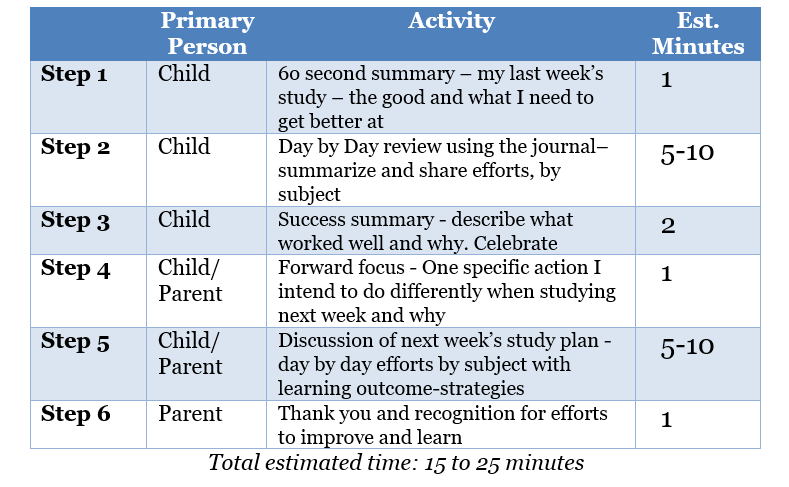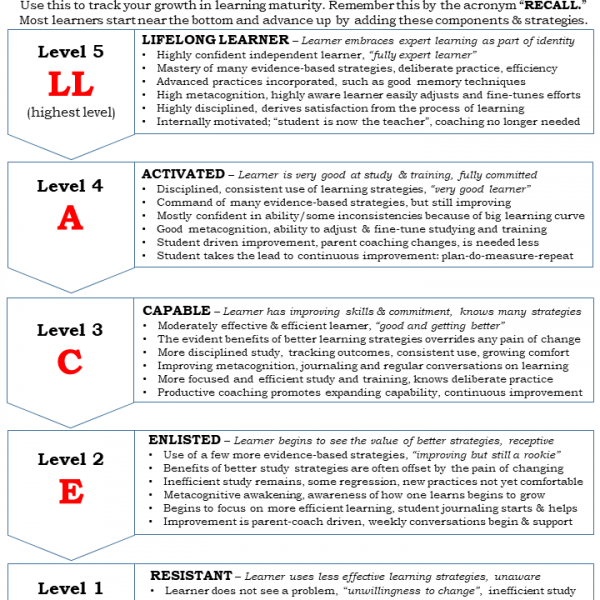
This Meeting is the Best Way to Improve Your Study Strategies

Reading time: 12 minutes
The Weekly SPR – Study Planning and Review Meeting
Introduction
This article explains one of the most important things you can do to create college-ready study skills.
This meeting is a “keystone habit” that by definition enables many other productive habits. With it, you will make rapid progress to improving student learning maturity that you need to become a Superlearner.
The study planning and review meeting is how you transform to highly effective study efforts and where you encourage and support the use of better evidence-based learning strategies. Pearson’s Law (see below) tells us why tracking and regular discussions of study practices, along with planning to study smarter over the coming week, creates sustained steady growth toward the use of much better habits and methods.
This paper will explain how you can conduct this weekly SPR meeting to improve your child’s student learning maturity.
Key Elements
The three important elements you will bring to this meeting are:
- The student who is prepared to discuss how she studied over the last week and what outcomes were achieved
- The study journal the student has used to record study practices and outcomes for this last week
- You as the parent coach who leads the meeting and encourages and helps your child to continue to improve
Pointedly, the SPR should not be about reviewing the quality of homework — this should be done in other discussions.
The SPR meeting is dedicated to one thing – promoting the process of continuous improvement.
Conducted properly, your student will look forward to it as a safe and uncritical place to talk about successes and accomplishments, as well as for getting support and encouragement in learning how to study smarter. In only 20 minutes you can do many important things!
We can’t overemphasize the importance of approaching studying smarter as a planned and deliberate ongoing change effort. There are no “silver bullets” or instant solutions to establishing better habits and practices. You need something that can “jump start” you and that can help you maintain momentum to allow new habits to become established. This meeting is how you move your child from less effective, but too comfortable set of skills, to much more effective study practices and methods.
Why? New more effective practices are often a little harder, because they are unfamiliar. If you don’t have a method to push yourself, it’s easy to abandon them because, at first, they don’t seem to be working.
Pearson’s Law
“When performance is measured, performance improves. When performance is measured and reported back, the rate of improvement accelerates.” — Pearson’s Law
If you want to really improve something, you need a method to measure it. Then you need a means to regularly discuss it so that you pay attention to it. Whenever you want to change something important – remember Pearson’s Law.
The Study Planning and Review meeting (SPR) should become your unique vehicle for planning and conversations on learning how to learn. It must not be confused with your many other conversations on learning specific subject matter, or with your ongoing teaching efforts. This meeting should have a different tonality that sets the stage and provides a forum for open conversations, explorations for you as self-scientists, and your coaching about better learning.
The SPR meeting should be designed to help you encourage metacognition (thinking about thinking) and to hold your child accountable for using these better study strategies.
It should also be a fun family meeting that your kids look forward to, because it provides an open table for celebrating successes, getting support, and promoting creative thinking about how to get better. It becomes the “glue” that holds all of your efforts together to much better learning.
Without a regularly scheduled meeting to encourage, support, and plan, it is much less likely that your change effort will accomplish your learning goals. Simply put, you can’t skip this step and hope to be successful over time. These are your steps every week:
 Sure, anyone can gain some small wins early on without a catalyst, but important thing to consider is what happens three months from now to sustain the progress? Don’t start quickly, then end up stopping short, when there is a world of great changes ahead for you when you stay the course. Committing to journaling with weekly discussions will maintain your efforts.
Sure, anyone can gain some small wins early on without a catalyst, but important thing to consider is what happens three months from now to sustain the progress? Don’t start quickly, then end up stopping short, when there is a world of great changes ahead for you when you stay the course. Committing to journaling with weekly discussions will maintain your efforts.
Of course, you can tailor this meeting to fit your own homeschooling values and parenting methods. However, examine these sound principles and guidelines to ensure these conversations are effective. Adapt these ideas to the ages and number of kids you are homeschooling.
Parent Reminders for Conducting SPR Meetings
- Don’t judge student efforts – you are not there to evaluate; you are there to support
- Don’t combine SPR with teaching – or other discussions. You have one purpose.
- This is not the forum to evaluate homework or the completeness of assignments
- It’s a conversation on getting better – and creating accountability
- Ask questions – guide and support- don’t “tell” your children how to study
You use this meeting to make incremental changes to the strategies your child uses to study. The best approach is to think about incremental aggregation of small wins where you might yield a 1% improvement each week. Through the magic of aggregation, you should be able to yield an improvement after one year of 4X!
Keep your “self-scientist” hats on! Both of you want to have conversations that move the bar forward and keep your child thinking about the joy of learning. Find balance between a fun tone with one that reflects the importance of the topic – don’t be so serious you turn your kid off.
Your primary role in SPR is that of coach. This means you will guide your child by asking great questions, steering your child to thinking about how to study smarter. Follow the 80/20 conversation guideline – the parent talks 20% of the time/ the child talks 80%. Focus only on the last week of study and how the lessons learned can be used to study smarter in the coming week.
Guidelines for Conducting the SPR
Here’s how it works:
- The parent opens the meeting and manages the time and agenda
- You both have your self-scientist “hats” on at all times!
- The parent asks and listens, the child shares, reports and explains
- You lead by thought provoking open-ended questions on why and how that will surface understanding and insights
- You can provide ideas and suggestions for your child to consider – but don’t “tell”
- You can be directive in one area – you need clear and reliable information on what happened in the last week through student daily study journaling. If you are not getting this, you can be more directive with daily 2-minute journal reviews for a while
Remember, you are not fixing things, you are opportunity finding!
You Can and Should Start Small
You don’t have to install a complete system in week 1! Your goal is to greatly improve over time. It’s also to build confidence and better daily habits. So, start small if you want. This can be a good strategy for many families. For example, focus your SPR conversations only on one subject. Then do just that for a month or so until you are ready to add more subjects to the meeting.
Remember – a big reason that new habits fail is because you try to tackle too much too early. Don’t shoot so high that you set yourself up for failure.
If you get one percent better each day for one year, you’ll end up thirty-seven times better by the time you’re done!
What Does a good SPR Agenda look Like?
This is an example of an SPR meeting. Note the times are estimates for a meeting with one child. However, the first few times you conduct this meeting, anticipate the times to be longer until you both learn to use the format.
Write a Self-Scientist Credo
Get your kid involved in writing your own credo as self-scientists. What will you commit to? Post it on the wall where it is visible where you will meet. Here’s an example.
- We are all about experimenting with new ideas and growing our brains
- We remain curious about what works and why
- There is no such thing as failure – only opportunities to learn
- We will try new things because we are curious
- We celebrate our “wins” and successes
- If something does not work, we never abandon our commitment to learning
The Power of Tiny Gains
The author James Clear, who is an expert on habits, promotes the power of “tiny gains.”
He thinks if you want to successfully change habits, it involves continuous improvement with dedication to making small changes and improvements every day, with the expectation that those small improvements will add up to something significant. This is good stuff.
He says, “The typical approach to self-improvement is to set a large goal, then try to take big leaps in order to accomplish the goal in as little time as possible. While this may sound good in theory, it often ends in burnout, frustration, and failure. Instead, we should focus on continuous improvement by slowly and slightly adjusting our normal everyday habits and behaviors.”
Use your weekly meeting to focus on continuous improvement and these important activities:
- Conversations that continue your journey to smarter study and better learning
- Practice of more and better learning strategies for more effective study efforts
- Improving your child’s metacognition or thinking about her own thinking
- Developing greater student accountability for smarter use of his study time
For More Information
If you need greater details on how to conduct this meeting, sign up for the Pa 10 course at the Center for Homeschooling, and also refer to our article on “Learning Maturity,” in the Parent Resources section.

OK, you have earned a cookie for reading this. Grab one and please sit down and think about starting your weekly study planning and review meeting!







